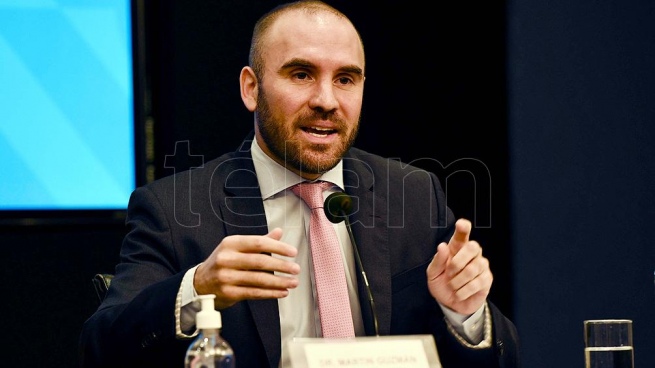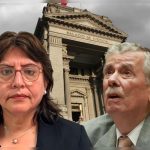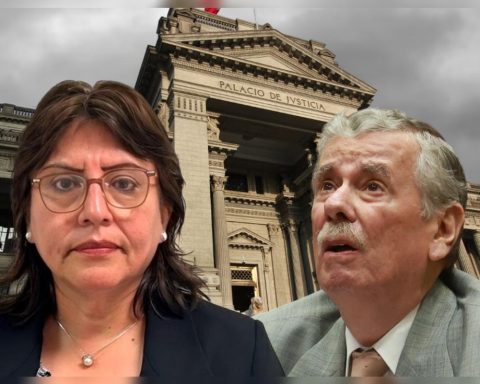The Minister of Economy, Martín Guzmán, reaffirmed that the agreement with the International Monetary Fund (IMF) “is not one of adjustment” since “real spending does not fall, but on the contrary grows”, while the president of the Central Bank, Miguel Pesce, affirmed that the understanding is “a great step” because it “reduces uncertainties” and will allow “Argentina to grow sustainably.”
Guzmán, in a report with Página 12, and Pesce, in a note with the newspaper Perfil, agreed that not having reached an understanding with the agency would have been “taking a step into the totally unknown” and that the understanding reached allows “reducing uncertainties”.
In the coming weeks, the technical teams of Argentina -under the supervision of Minister Guzmán- and the IMF will have an intense task -especially throughout February- to finish shaping the Letter of Intent, the Memorandum of Economic and Financial Policies and the Memorandum of Technical Understanding, which must then have the endorsement of the Board of Directors of the agency and the National Congress.
To this activity, the head of the Palacio de Hacienda will also add this week the trip that President Alberto Fernández will make to Russia and China starting on Tuesday, in which he will be part of the delegation that will accompany the head of state.
The The financing program that Argentina and the IMF face is called Extended Facilities, which establishes for each disbursement a repayment period of 10 years, with a grace period of four and a half years.
In practice, this means that Argentina will not pay the debt with the Fund until 2026, managing to continue on the path of recovery.
Based on what was reported by Minister Guzmán last Friday, the total disbursements that Argentina will receive through the new program is equivalent to the amount of the Stand By loan executed by the government of Mauricio Macri, for more than 44,500 million dollars.
The commitments assumed will have technical reviews every three months, for two and a half years. Each review -which will end in the second half of 2024- will be accompanied by a disbursement, which will be conditional on the approval of the review.
From the Treasury Palace they emphasize that the gradual reduction of the deficit foreseen in the understanding “is consistent with a growth in spending in real terms” and they emphasize that “Argentina was able to reach an agreement with the IMF without there being policies of adjustment, nor inhibit the continuity of the recovery of the economy”.
In the report with Página 12, Guzmán said that in the framework of the negotiations with the organization “there was a moment in which the conditions in which an agreement could be reached were adjustment conditions, and we considered that this was not a viable way of moving forward” since “it would have damaged the possibilities of the Argentine economic recovery that is being experienced today, in which the possibility of continuing to generate employment is strong”.
“Not refinancing the debts and not paying would also have meant a lack of dollars in the country, and that would have altered the possibilities of continuing growth, generating employment,” added the minister.
Next, Guzmán stated that “the path of non-agreement” was “taking a step towards the totally unknown.”
“We went to the side that allowed us to go down a passable path, where we had refinancing to deal with those debts and have more time, in the meantime to grow. And based on growth, build the conditions to pay,” he completed.
Fish, on the other hand, expressed his confidence that “we are going to have a process of inflationary deceleration”, in which the reduction of the fiscal deficit will contribute, and that for the current year they project an increase in international reserves “of the order of 5 billion dollars.”
Regarding the economy, the head of the Central Bank maintained that “we are at a growth floor for this year of the order of 4%” and even hinted that “it is very possible that Argentina will surprise again with its interest rate. growth this year.
“Argentina’s growth rate is always surprising, as it was surprising last year, when in September we were expecting growth of the order of 7% and it ended up being 10%,” the official slipped.
Pesce also emphasized that “we are working so that there is an increase in reserves, it is a point of discussion that we have with the International Monetary Fund. It not only depends on our surplus in the foreign exchange market, but also on this contribution that the Monetary Fund is going to make.”
“We have a month of interest expiration ahead of 1.5 billion dollars per year, but we are going to receive this disbursement of around 4.3 billion. So there we have an increase in reserves and we are also expecting an increase in reserves as a result of the negotiations with the multilateral credit organizations with which we are working bilaterally and also in cooperation with the International Monetary Fund, so that this year we have a positive net result,” he said.
After which he summarized that “we are expecting an increase in reserves for the end of the closing, when we are talking about the order of 5 billion dollars, but this is something we are working on and fine-tuning numbers because we still have discussions with the Fund with respect to this figure”.

















